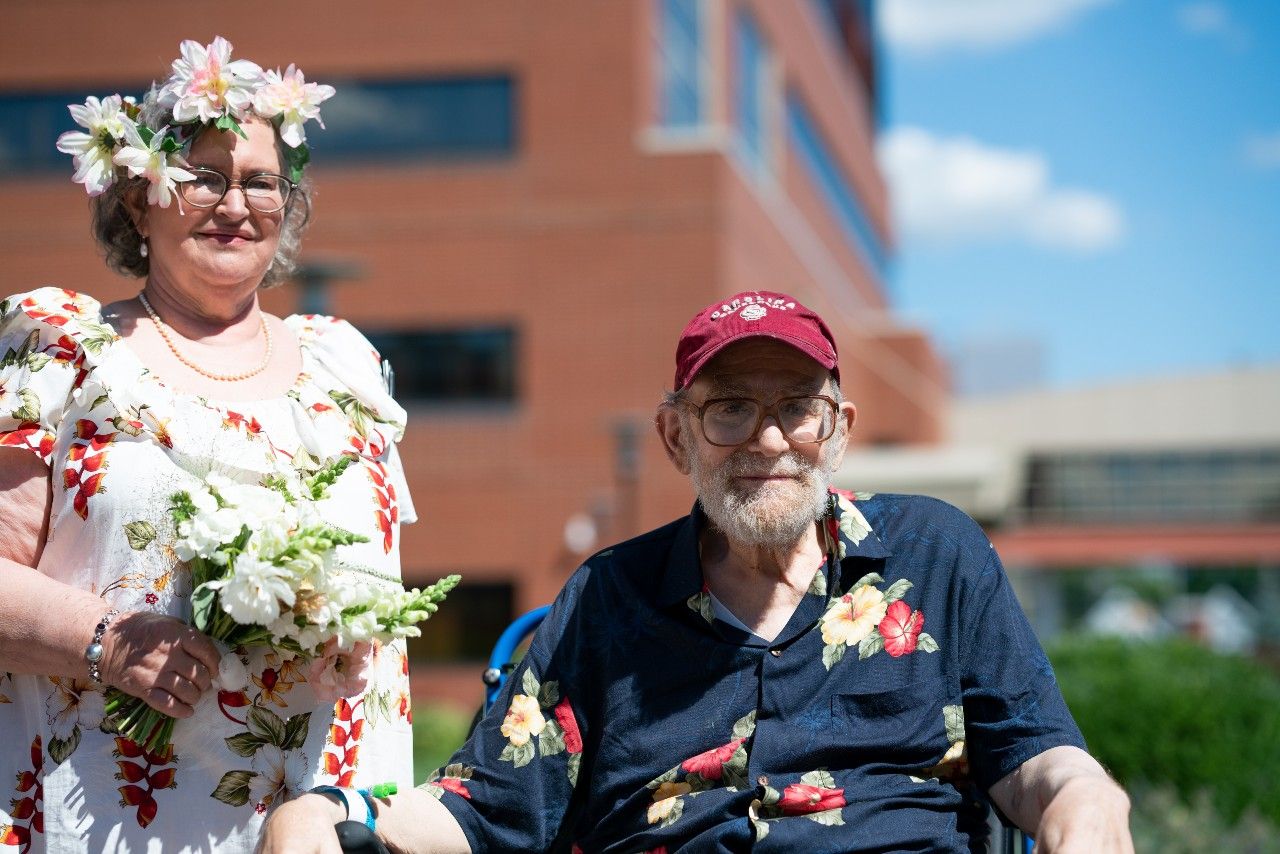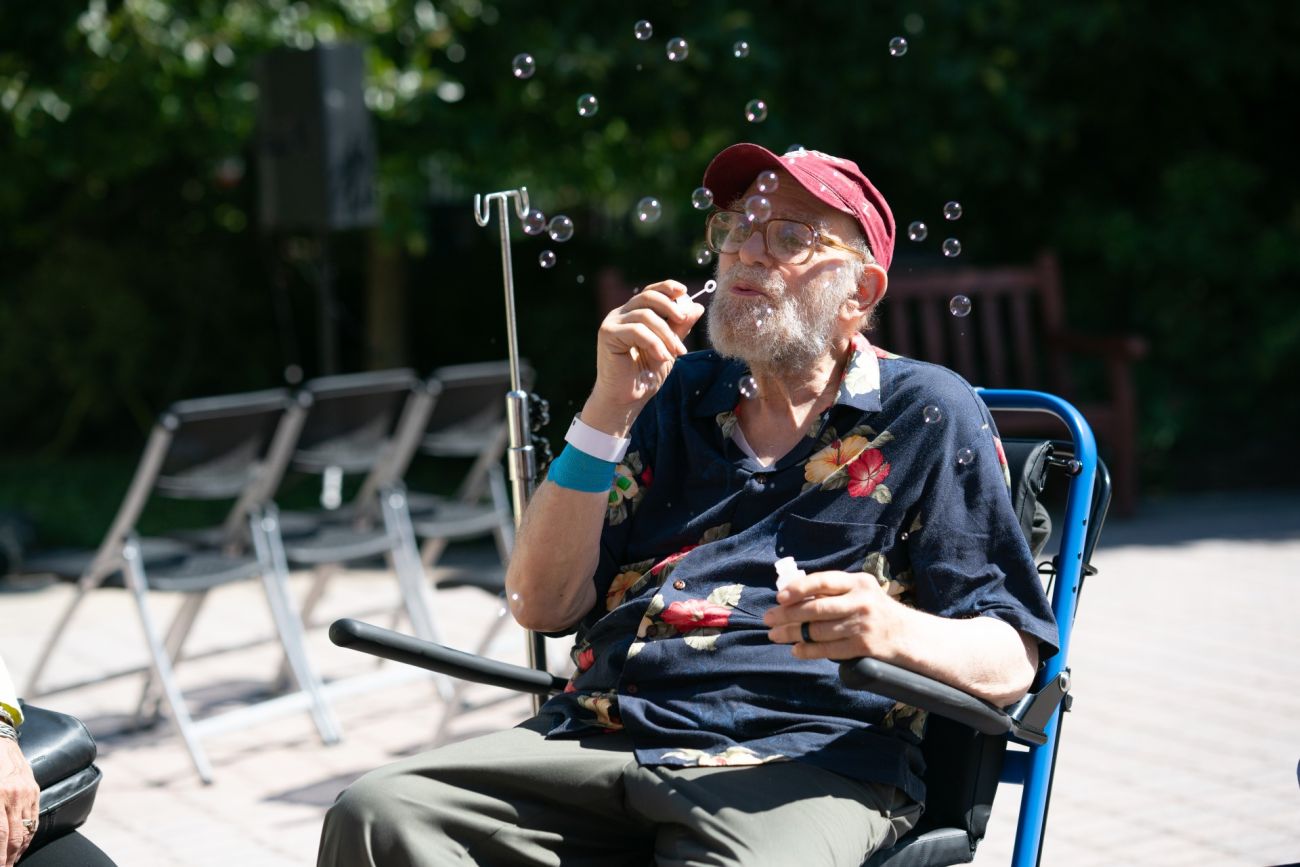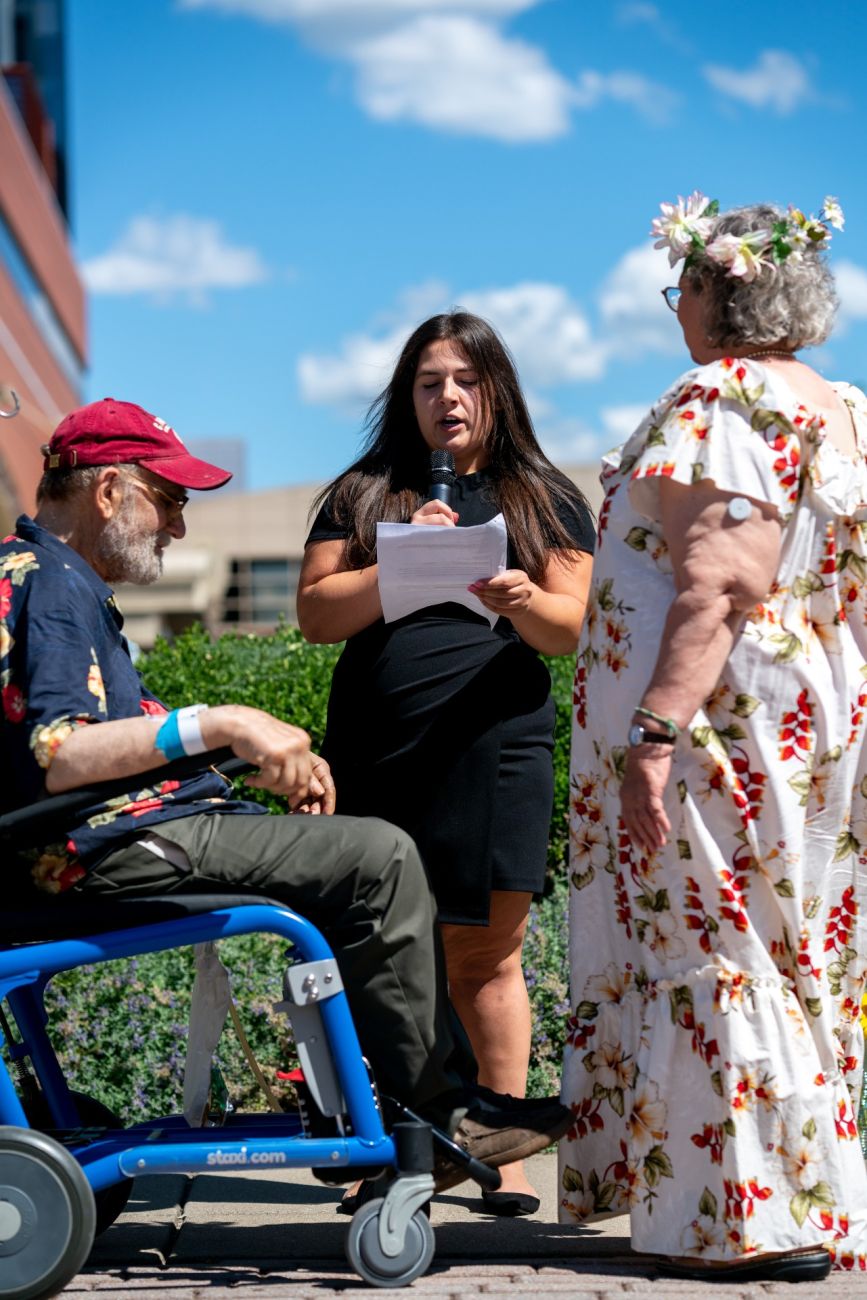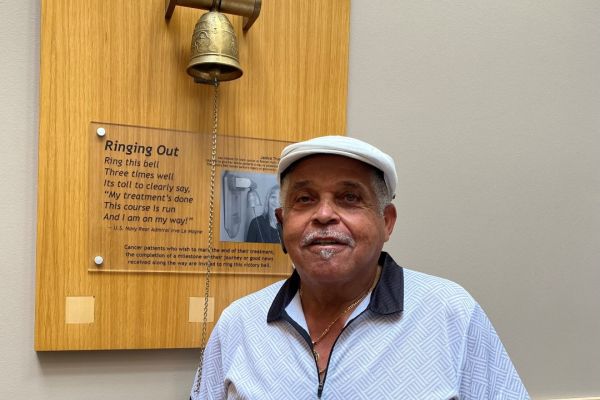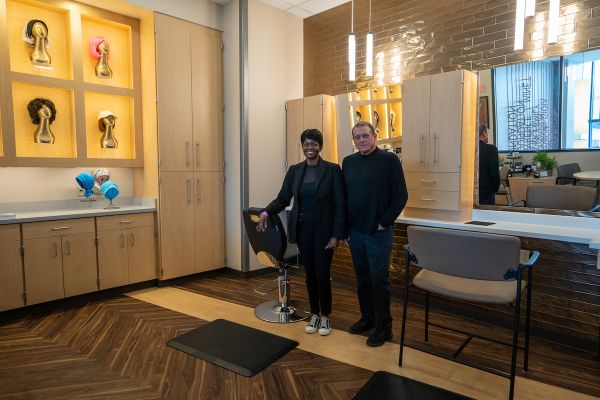In early 1975, Patricia McMullen heard someone playing a flute. She went to investigate where the sound was coming from and who was making it.
She found Stanley Dayan, a self-proclaimed hippie who ran away from Colgate University because it was “too stuffy,” playing a flute he carved himself.
On August 11, they were married in Kaminski Park in the heart of Roswell Park Comprehensive Cancer Center, nearly 47 years after they started dating.
“She deserved to get married a long time ago,” Stanley says. They held off for this long because they didn’t need a license and jewelry to cement their relationship. After all, they had two kids together, a son and a daughter, and have been together through all the ups and downs that come with nearly five decades together.
Stanley decided it was time, however, after being treated at Roswell Park for prostate cancer. He asked Patricia, once again, if she’d marry him. “She keeps saying no. She pooh-poohed it, but all the friends smiled, they chuckled. I said if everybody chuckles, we’re getting married. If she wants to.”
His bride-to-be sat on the other side of his room, her hair freshly styled in the Elevate Salon an hour prior.
Steadying forces in an unsteady world
As Patricia recalls, the months before she met her now husband were not the best times. She was grieving the loss of a few relatives and trying to make sense of things. She was walking near the south campus of the State University of New York at Buffalo when she heard music.
There he was, a muscular man with long hair, playing a beautiful song. They struck up a conversation and, for their first date, Stanley took her to see Jethro Tull play in Buffalo. For that date, as for most of their early courtship, Stanley brought her a gift: a flute he’d carved for her.
“He picked me up and I said 'where’s your car?' and he said 'we have to hitchhike.' It was crazy,” she recalls.
Their relationship was not without some hurdles. Stanley had been married before and his family wasn’t thrilled that she wasn’t Jewish. But they loved each other. That’s what mattered. Stanley, after earning his philosophy degree at UB, worked for seven years at Bethlehem Steel in Lackawanna. She worked as a buyer for the Lexington Co-op for 25 years and spent time at department stores including AM&A’s and Bon Ton.
They raised their children and built a life together. After his father died in 1987, Stanley decided to take on work as a handyman, something steady and regular because “that’s what needed to be done. It was time to grow up.” He earned his reputation and jobs by word-of-mouth advertising and referrals. He didn’t give up his love for tinkering, continuing to carve flutes and recorders, eventually moving on to carve intricate moldings for houses he’d buy and renovate.
Patricia didn’t always love or approve of Stanley’s flair for such risky hobbies. “He likes danger,” she says. “He used to put the rock ‘n’ roll stages together at Rich Stadium. He was on the Diana Ross show on a tower in Central Park. When we went to Maui the first time, he went and did dangerous things. He likes that. What are you going to say? You can’t do that? He likes that, he likes the real physical kind of stuff. That’s how he’s built.”
But why stay with someone so long if their passion projects make her uneasy? Many people would try to change their partner, encouraging safer, more ordinary interests.
“I just am never bored. He’s just a very smart man. I guess that’s the main thing. I have to have someone who’s entertaining. That sounds kind of silly doesn’t it?” Patricia says. “He may be a pain in the butt, but he’s not boring.”
Never miss another Cancer Talk blog!
Sign up to receive our weekly Cancer Talk e-newsletter.
Sign up!An unorthodox wedding
For the hippie and the pragmatist, the decision to get married was one made out of protection. After being discharged from Roswell Park for his treatment, Stanley will need to spend some time in a rehabilitation facility to regain some of the strength he lost. They already listed each other as beneficiaries in their wills, but they wanted something more legal, something more permanent.
When the time came to make arrangements for their ceremony, they went with an unconventional route – it’s really the only way they could embrace the idea of such a “square” tradition. They asked their nurse, Margherita “Maggie” Inglima, a newer nurse to Roswell Park but one who has spent every night with Stanley, checking in on him during her rounds and keeping him company. She was ordained for their ceremony, specifically, because she’s grown very fond of the couple.
In the park, on a perfectly sunny day, Stanley and Patricia made their way down the long sidewalk together, she in a white flowered dress with a crown of plastic flowers, he in a dark blue flowered shirt. “There’s something mythical about it. Weddings are ritualistic. There’s a very deep thing about weddings,” Patricia says.
When asked why they didn’t get married sooner, the answer was simple. “I think, in some ways, I didn’t have to have a contract to trust him that way,” she replied. “He’s always taken care of me. We take care of each other. You can’t really buy that.”
In front of a small group of friends, family and most of the nurses from 7 West, where Stanley was staying, they exchanged vows and rings. Patricia wore a ring one of the nurses picked up a few days before from a store – the ring Stanley made for her years ago was being fixed and wasn’t ready in time for the ceremony. They celebrated with a cake adorned with yellow flowers, clinking small plastic champagne flutes filled with sparkling grape juice. Stanley blew bubbles out of a small white plastic bottle.
Patricia didn’t want a big wedding. She wanted a small, simple ceremony, no fuss, no big production. But when word got out among the nurses, it became a little bit of a spectacle. “Roswell Park has done so much for my husband,” she said a few hours before the ceremony. “I feel like it’s good to get married here. In some ways, it feels very apt. You don’t know what’s going to happen. That’s all part of the picture. Who would know they’d get married at Roswell Park?”
Cancer might have taken some of Stanley’s mobility, but it gave him back his zeal for life. Before he got sick, he had run out of ideas, of new challenges, he says. Spending so much time in a hospital bed, thinking about his life and how close he was to losing it, changed his perspective.
“I should’ve been dead a year ago,” he says. “Now I have a whole new perspective on life. I see it very differently. I’m not the same person.”
Editor’s Note: Cancer patient outcomes and experiences may vary, even for those with the same type of cancer. An individual patient’s story should not be used as a prediction of how another patient will respond to treatment. Roswell Park is transparent about the survival rates of our patients as compared to national standards, and provides this information, when available, within the cancer type sections of this website.
